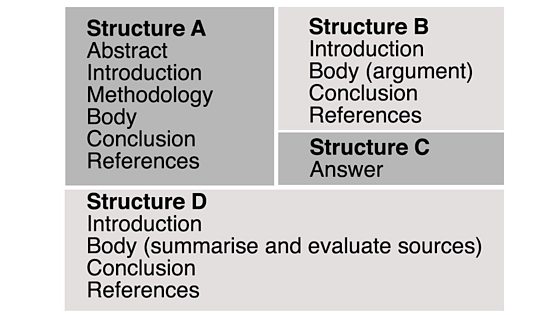Unit 4: Go The Distance: Academic writing
Select a unit
- 1 Go The Distance: Choosing distance learning
- 2 Go The Distance: Academic reading
- 3 Go The Distance: Academic talk
- 4 Go The Distance: Academic writing
- 5 Go The Distance: Finding and using source material
- 6 Go The Distance: Going the distance
- 7 Go The Distance: Critical thinking
- 8 Go The Distance: Social learning
- 9 Go The Distance: Projects
- 10 Go The Distance: Succeeding in exams
Session 4
Academic Writing 4 – Written assignments
Welcome back to Academic Writing – the course with the tips and tools to get you on course for writing success. This time we're looking at perhaps the most important part of academic writing: understanding your assignments!
Activity 1
Start writing successful assignments
Do you have to write an essay, a report, or something else? It can be tricky to know where to begin – so let's start with the basics. Try our activities on types of academic assignment, a quiz on question words, an explanation of structure and more!
Try the activity

What type of assignment do you have to write?
You've been set your assignment and you've got to start writing – or have you? There are a number of different types of assignment that you might have to write. The first thing you should do is make sure you know WHAT you have to write – is it an essay, report, literature review, or something else? Read on to find out what you need to do with academic writing.
Read about four different types of written assignment and check you understand their particular characteristics. We'll test what you've learned further down this page.
Assignment type 1: Essays
The main purpose of an essay is to make an argument. As such, essays need a clear structure and good research. They’re often longer pieces of writing.
Assignment type 2: Reports
Reports are written to present research and analyse findings. They contain particular sections such as an abstract – which is a summary of the findings, and a methodology section – which details the research methods used. Reports tend to be more impersonal and objective than essays. They are more common in sciences and business courses than humanities.
Assignment type 3: Literature reviews
These are written to systematically review academic materials on a particular topic (‘the literature’). They are often used to identify gaps in what has already been written by the academic community.
Assignment type 4: Short-answer assignments
These involve writing brief answers to one or several questions, which are designed to test subject knowledge and information-processing skills. They’re often done as regular homework or exams, rather than as longer pieces of work.
To do
Match these four types of written assignments with the structures displayed in this image.

Match the assignment types
4 Questions
Match the assignments types to the example structures.
Help
Activity
Match the assignments types to the example structures.
Hint
Structure A is an assignment that includes an abstract; Structure B is an assignment that has an argument; Structure C isn't very long; Structure D requires you to evaluate sourcesHelp
Activity
Match the assignments types to the example structures.
Hint
Help
Activity
Match the assignments types to the example structures.
Hint
Help
Activity
Match the assignments types to the example structures.
Hint
Excellent! Great job! Bad luck! You scored:
Match the assignment types
4 Questions
Match the assignments types to the example structures.
Help
Activity
Match the assignments types to the example structures.
Hint
Question 1 of 4
Help
Activity
Match the assignments types to the example structures.
Hint
Question 2 of 4
Help
Activity
Match the assignments types to the example structures.
Hint
Question 3 of 4
Help
Activity
Match the assignments types to the example structures.
Hint
Question 4 of 4
Excellent! Great job! Bad luck! You scored:
Next
You've got the structure sorted – now it's time to take a look at what you have to do in different written assignments. Go to the next activity page to find out how to make sense of question words.
Session Vocabulary
Find out more about distance learning – visit our partner,The OU
____________________